28 have author last names that start with T have author last names that start with T
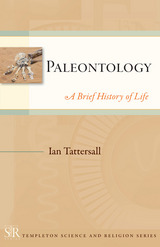
"Endlessly absorbing and informative. It would be hard to imagine a better introduction to this most important and fascinating field.”—Bill Bryson, author of A Short History of Nearly Everything
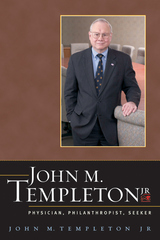
Candidly, with a mixture of joy, poignancy, and gratitude, the chairman and president of the John Templeton Foundation reflects on the learning and growing he has experienced and the perspectives he has gained throughout his life. In so doing, he continues the legacy of his father, Sir John Templeton, who has used stories from his life to provide instruction for his children, grandchildren, and other future descendants, just as he has drawn on those stories in his many books of inspiration and guidance for the general public.
Dr. Templeton shares stories about his personal life, his career in medicine, his early involvement with philanthropy, and his commitment to the John Templeton Foundation and its mission. Events and circumstances in his youth opened him to spirituality, taught him about altruistic love, and introduced him to values he would cultivate throughout his life: thrift, saving, hard work, creativity, and responsibility.
His journey takes him from his early life in Winchester, Tennessee, to New Jersey, Yale University, medical school, the Navy, the Children's Hospital of Philadelphia, and the John Templeton Foundation. Along the way, there were lessons learned from his disruptive behavior in elementary school; the deaths of his grandmother and mother; travel to Europe, Africa, and throughout the U.S.; marriage and fatherhood; his growing commitment as a Christian; and his family's experience with an armed robbery. It continues with his experiences in pediatric surgery at the Children's Hospital of Philadelphia, including work with conjoined twins; experience with the mutual fund industry and a role with the Templeton Growth Fund; an intensely rewarding medical specialty in trauma; philanthropy and fund-raising efforts, including a sad experience with fraud; the pride of professorship; and serving as chairman and president of the John Templeton Foundation.
With gratitude he credits his many mentors for the wisdom they passed on to him. Among them are John Galbraith, Dr. C. Everett Koop, Dr. Albert Schweitzer, and, of course, always and above all, his father. With appreciation, he recounts the blessings of a full and productive life that continue today as he provides leadership to the diverse programs and initiatives of the John Templeton Foundation.
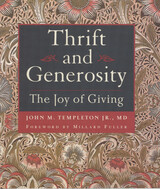
In these difficult economic times, thrift may seem like a necessity, rather than a route to joy. But in this handbook, the reader learns about the virtue of thrift, and how, in combination with gratitude and generosity, it can lead to deep, lasting contentment.
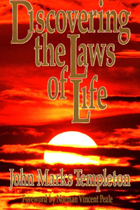
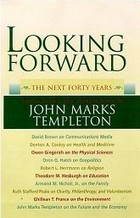
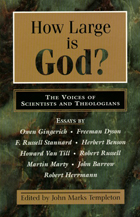
This new collection of essays reveals how very little we know about God and fundamental spiritual principles. In recent years, scientific research has revealed that the universe is staggering in size and intricacy, and some scientists are now suggesting that our definition of God is much too small. Nine distinguished scholars and scientists present their varied views on the dimensions of God.
Edited by philanthropist John Marks Templeton, this fascinating and challenging book continues the exploration of theological and philosophical implications of the momentous and accelerating scientific discoveries of our times.
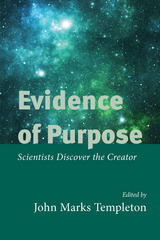

For young or old, rich or poor, this wisdom will find many applications in people's lives. This inspiring collection of time wisdom by Sir John Templeton, presented in a beautiful gift book, is perfect for a person seeking deeper meaning in life. Practical and uplifting advice based on a lifetime of experience is gathered in an attractive package for personal use or as a perfect gift. Juxtaposed to his sayings are short essays that elaborate on the ideas and make them easier to understand and apply. Themes, such as thanksgiving, forgiveness, positive thinking, love, humility, and happiness, arrange the thoughts.
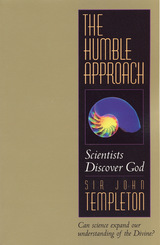
For generations the discoveries of science tended to challenge the very existence of God. Templeton makes a striking argument for just the opposite point of view. He goes to the writings of many of the world's leading scientific thinkers—as diverse in background as Albert Einstein and Teilhard de Chardin—and discovers them in awe of the universe, perceiving the hand of Divine mystery at work.
The Humble Approach teaches that man can discover and comprehend only a few of the infinite aspects of God's nature, never enough to form a comprehensive theology. The humble approach may be a science still in its infancy, but it seeks to develop a way of knowing God appropriate to His greatness and our littleness.
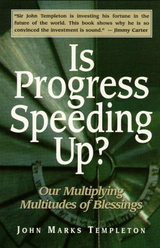
This book is a thought-provoking view of the progress of humankind in the last century. In spite of the pessimism that prevails in the media, people are better fed, better clothed, better housed, and better educated than at any previous time.
The facts within the book provide documentation for a positive outlook toward our nutrition and health, living standards and working conditions, political and economic freedoms, educational facilities, ability to communicate, ease of movement, increasing leisure, and, most important, our ability to get along with one another and with our Creator. The statistics, charts, and photographs that illustrate this book enhance the reassuring and uplifting view of the state of the world and where it is going.
“His analysis gives us a refreshing balance to the negative, sometimes cynical, views in the media that tend to portray the worst rather than the best in human civilization.” —Jimmy Carter
“After reading Sir John Templeton's latest book, I believe more than ever that we are living in the most exciting time in history. Despite the challenges we face, his demonstration of mankind's progress gives all of us great hopes and high expectations for our next century and the new millennium.” —Jack Kemp, former HUD secretary, director of Empower America
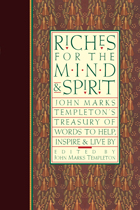
This book contains a collection of John Templeton's favorite inspirational passages.
“From the Bible, from philosophers and poets, and from other writers, we begin to form a clear understanding of the spiritual and ethical laws of life. The world's literature teaches us valuable lessons that no amount of money can buy. Those lessonsare there for everyone. They are free and they are priceless.”—John Marks Templeton
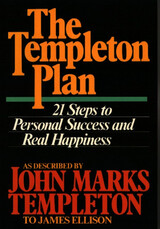
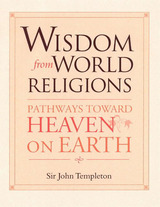
Every religion acknowledges certain spiritual principles and records them in its sacred literature and traditions. This book curates these ancient teachings and shows how they apply to modern life with the help of parables, quotations, and commentaries.
By reading Wisdom from World Religions, people from all walks of life will be inspired to pursue their own spiritual growth and to contemplate questions central to our existence, such as how, through love and creativity, can we be agents of divinity on earth?
Uplifting and instructional, this is a book to be treasured, studied, and practiced.
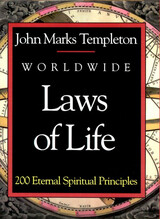
Worldwide Laws of Life is full of wisdom drawn from the major sacred Scriptures of the world and various schools of philosophical thought, as well as from scientists, artists, historians, and others. Its aim is to assist people of all ages to learn more about the universal truths of life that transcend modern times or particular cultures.

Drawn from classical and religious texts, as well as the work of poets and other artists, Worldwide Worship is a unique celebration of worship found in many religious traditions. These selections have been chosen singularly and as a group by John Marks Templeton, not only for their individual aesthetic beauty, but also to assist us in learning various lessons of life.
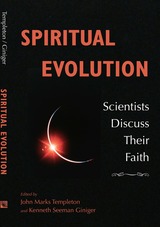
Spiritual Evolution: Scientists Discuss Their Beliefs describes the intellectual and emotional journeys traveled by esteemed scientists worldwide. Authors share the personal steps they have taken to blend an understanding of the Divine with their scientific perspectives.
Charles Birch, S. Jocelyn Bell Burnell, Larry Dossey, Owen Gingerich, Peter E. Hodgson, Stanley L. Jaki, Arthur Peacocke, John Polkinghorne, Russell Stannard, and Carl Friedrich von Weizsäcker offer accounts of their spirituality and scientific inquiry. Noting the impact of religious upbringing, academic and spiritual mentors, personal devotional practice, and study, these authors make a compelling case for the blending of both scientific and spiritual worlds. They share insights that keep them attending church, engaging in prayer, and continuing the search to understand the Infinite.
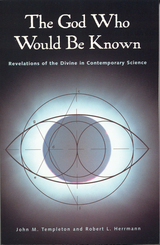
—from the authors
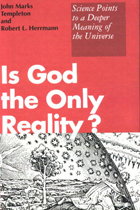
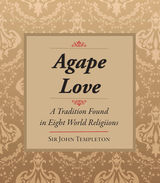
The tradition of agape, or unconditional love, is not exclusive to any religion. It is a primary underlying principle found in religions worldwide. The concept of altruistic love challenges the spiritual person to "love your enemies" or to "love without thought of return." It is a love that flows out to others through compassion, kindness, tenderness, and charitable giving.
Buddhists have a path of compassion, where caring for others becomes the motivating force behind existence. Hindus have a branch of yoga, the heart-centered path, that leads to enlightenment through an overwhelming love for God that takes the form of loving all humanity. Eastern religions, such as Taoism and Confucianism, see transcendent love as essential to true wisdom.
Love is a universal theme of love found in all religious traditions, Buddhist, Christian, Islam, or others. As we realize that all religions have this spiritual principle of love at their core, we can develop a sense of shared humanity. The religious tradition of agape love examined in this book will inspire those who are learning to grow in compassion and love for all people.
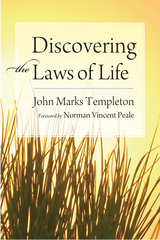
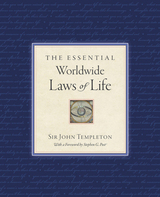
What does it mean to live a good life?
The major scriptures of the world, various schools of philosophical thought, storytellers, scientists, artists, and historians have all offered answers to this question. Surprisingly, these answers are common among nearly all sources. Famed investor and philanthropist Sir John Templeton called these commonalities the “laws of life.”
Templeton gathers the best of these teachings in The Essential Worldwide Laws of Life. This handsome volume shows readers of all ages, from all parts of the world, how to make their lives more joyous and useful by learning the universal truths that transcend time and culture.
Each law is presented in an essay format, with stories, commentary, and quotations to illustrate its importance. The material is designed to inspire the reader to put these laws into practice and to enjoy the rewarding life that will result.
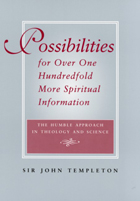

Understanding and expressing unconditional love—also called agape love—can be a lifelong quest. First, however, we must ask ourselves and others what it is. Is it an action, a universal energy, or a creative principle? And if we understand it, can its expression ever be realized, or is it simply a divine attribute?
These and other questions are addressed in an inspirational and practical style in this philosophical essay from Sir John Templeton. He seeks to define pure, unlimited love as the "transcendent power of divine love that expresses itself through our hearts and minds when we are open and receptive to it." Its greatest attributes are love, joy, peace, patience, kindness, goodness, faithfulness, gentleness, and self-control.
Another important concept is that God's love is given to us because we seek and accept it, not because we deserve it. It is the humble and sincere person who is most receptive to God's perfect love. This love can be awakened in other people through the action of love itself. We learn what it is from those who have it, and we can begin to recognize it through loving service to others.
Basic reality seems to be that the more you try to be like God by radiating unlimited love, the more you become flooded by waves of love from others and from God. Sir John summarizes with the statement, "How wonderful it would be if we could begin to say whenever we meet or depart, 'God loves you and I do too.'" This, in fact, is the essence of pure, unlimited love—a concept we can understand and can begin to practice in our daily lives. This thoughtful book can serve as an inspiration as well as a step-by-step guide on how to put this into practice.

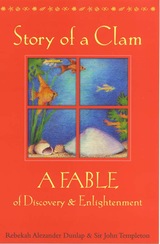
Story of a Clam is a special, magical tale of an egotistical clam who thinks he and his community are the center of the universe. It offers us the artistry of the written word, creating an adventure in evolving consciousness. In an exciting series of events, the clam becomes aware that "there is more to life than you presently know and experience."
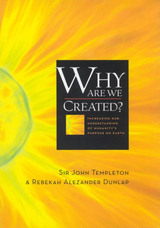
While many books strive to stimulate thinking through provocative anecdotes and theories, Why Are We Created? takes a different path. It begins with a question and continues with a multitude of questions like these:
•What is the importance of recognizing the presence of the sacred within us and around us?•How can individuals create a purposeful and fruitful way of life?
•How does happiness relate to one's purpose?
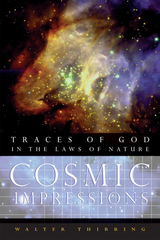
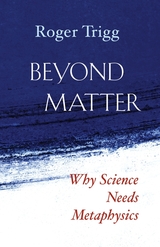
Does science have all the answers? Can it even deal with abstract reasoning beyond the world we experience? How can we ensure that the physical world is sufficiently ordered to be intelligible to humans? How can mathematics, a product of human minds, unlock the secrets of the physical universe? Should all such questions be considered inadmissible if science cannot settle them?
Metaphysics has traditionally been understood as reasoning beyond the reach of science, sometimes even claiming realities beyond its grasp. Because of this, metaphysics is often contemptuously dismissed by scientists and philosophers who wish to remain within the bounds of what can be scientifically proven. Yet scientists at the frontiers of physics unwittingly engage in metaphysics, as they are now happy to contemplate whole universes that are, in principle, beyond human reach.
Roger Trigg challenges those who deny that science needs philosophical assumptions. Trigg claims that the foundations of science themselves have to lie beyond science. It takes reasoning apart from experience to discover what is not yet known and this metaphysical reasoning to imagine realities beyond what can be accessed.
“In Beyond Matter, Roger Trigg advances a powerful, persuasive, fair-minded argument that the sciences require a philosophical, metaphysical foundation. This is a brilliant book for newcomers to the philosophy of science and experts alike.” —Charles Taliaferro, professor of philosophy, St. Olaf College
READERS
Browse our collection.
PUBLISHERS
See BiblioVault's publisher services.
STUDENT SERVICES
Files for college accessibility offices.
UChicago Accessibility Resources
home | accessibility | search | about | contact us
BiblioVault ® 2001 - 2024
The University of Chicago Press









